

This Intense Infographic Breaks Down The Biggest Climate News of 2019. It's easy to feel overwhelmed with climate news these days.
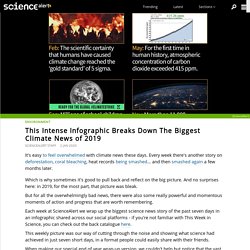
Every week there's another story on deforestation, coral bleaching, heat records being smashed... and then smashed again a few months later. Which is why sometimes it's good to pull back and reflect on the big picture. And no surprises here: in 2019, for the most part, that picture was bleak. But for all the overwhelmingly bad news, there were also some really powerful and momentous moments of action and progress that are worth remembering. Each week at ScienceAlert we wrap up the biggest science news story of the past seven days in an infographic shared across our social platforms - if you're not familiar with This Week in Science, you can check out the back catalogue here. This weekly picture was our way of cutting through the noise and showing what science had achieved in just seven short days, in a format people could easily share with their friends.
Climate Change Connection. On this page, you will find resources that you can use to help you teach climate change in your classroom: Click a link in the list above to jump to that topic on this page.
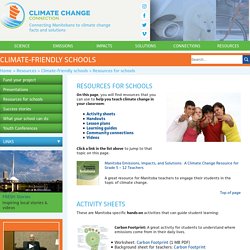
Manitoba Emissions, Impacts, and Solutions: A Climate Change Resource for Grade 5 – 12 Teachers A great resource for Manitoba teachers to engage their students in the topic of climate change. Top of page These are Manitoba specific hands-on activities that can guide student learning: Carbon Footprint: A great activity for students to understand where emissions come from in their daily lives. Worksheet: Carbon Footprint (1 MB PDF)Background sheet for teachers: Carbon Footprint Backgrounder (125 KB PDF)Learning Outcomes: Carbon Footprint Learning Outcomes (128 KB PDF) From The Conversation for November 5 2019 - 1452913765&utm_content=Latest from The Conversation for November 5 2019 - 1452. Have a Greenhouse Gas Attack! Have a Greenhouse Gas Attack!

Some gases in the atmosphere are called greenhouse gases, because they have a greenhouse effect on Earth. If not for any greenhouse gas, Earth would be too cold. But too much greenhouse gas can make it too hot. Help Earth get rid of the excess greenhouse gases in the atmosphere. Scientists Create a Material That Captures CO2 And Turns It Into Organic Matter. Scientists have come up with an innovative way to try and counter the massive amounts of carbon dioxide we're still pumping into the air, even as a climate crisis unfolds around us: turning that CO2 into a useful organic polymer.
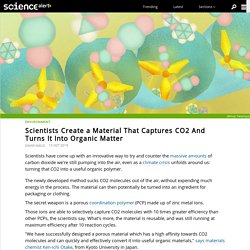
The newly developed method sucks CO2 molecules out of the air, without expending much energy in the process. The material can then potentially be turned into an ingredient for packaging or clothing. The secret weapon is a porous coordination polymer (PCP) made up of zinc metal ions. Those ions are able to selectively capture CO2 molecules with 10 times greater efficiency than other PCPs, the scientists say. What's more, the material is reusable, and was still running at maximum efficiency after 10 reaction cycles. 1508522413. Before the Flood Full Movie National Geographic. A Letter From The Future. Dear 2019, I know you've had some rough years recently.
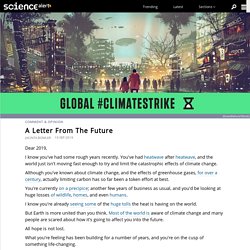
You've had heatwave after heatwave, and the world just isn't moving fast enough to try and limit the catastrophic effects of climate change. Although you've known about climate change, and the effects of greenhouse gases, for over a century, actually limiting carbon has so far been a token effort at best. You're currently on a precipice; another few years of business as usual, and you'd be looking at huge losses of wildlife, homes, and even humans. A shot of hope in the face of climate despair. Hope, like a slinky, springs eternal.
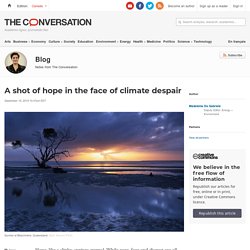
While rage, fear and disgust are all appropriate responses to the realities of climate change (which we have explored extensively this week), we must move from despair to action. Fortunately, many courageous and dedicated people have spent decades chipping away at the persistent problems that plague us, and The Conversation has been publishing their results for years. As an antidote to despair, here is just a small sampling from our archives of radical solutions, practical remedies and solid action plans. We have the tools we need – now we have to use them. Transport Australia is unique in the developed world in not having minimum fuel efficiency standards.
Instead, let’s follow New Zealand’s plan to introduce clean car standards and incentives to cut emissions. American Teens Are Frightened by Climate Change, But They're Starting to Take Action. What You Think You Know About Climate Change Is Probably Wrong. We humans have a natural tendency to focus on negative stories.

We tend to assume things are worse than they really are, and going downhill fast. We forget how bad things were in the past and how far we've come. In reality, the world is often better — and getting better — than we think, something I wrote about in my book, The Perils of Perception: Why We're Wrong About Nearly Everything. Murder rates, deaths from terrorism and extreme poverty are all down.
Life expectancy, health and education levels are up. A new survey of Britons which tested understanding of some key facts about the environment reveals the extent of environmental misperceptions. Climate change in 2016: the good, the bad, and the ugly. Brutally Simple Illustration Shows Climate Change's True Scale Everywhere on Earth. The UK Has Gone 6 Days Without Burning Coal Now, And Guess What, The World Didn't End. Sir David Attenborough Warns Civilisation Is Near Collapse Unless We Act Now.
The First Carbon Neutral Country in the World. 10 Solutions for Climate Change. The enormity of global warming can be daunting and dispiriting. What can one person, or even one nation, do on their own to slow and reverse climate change? But just as ecologist Stephen Pacala and physicist Robert Socolow, both at Princeton University, came up with 15 so-called "wedges" for nations to utilize toward this goal—each of which is challenging but feasible and, in some combination, could reduce greenhouse gas emissions to safer levels—there are personal lifestyle changes that you can make too that, in some combination, can help reduce your carbon impact.
Not all are right for everybody. Some you may already be doing or absolutely abhor. But implementing just a few of them could make a difference. Forego Fossil Fuels—The first challenge is eliminating the burning of coal, oil and, eventually, natural gas. Why-aren-t-they-doing-anything-students-strike-to-give-climate-lesson-20181123-p50hvu. Trump denies climate change because of record low temperatures. President Donald Trump on Wednesday once again called into question whether climate change was real.
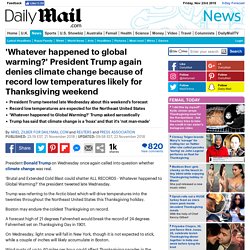
‘Brutal and Extended Cold Blast could shatter ALL RECORDS - Whatever happened to Global Warming?’ The president tweeted late Wednesday. Trump was referring to the Arctic blast which will drive temperatures into the twenties throughout the Northeast United States this Thanksgiving holiday. ACE Science Short: Ocean Acidification. Royal Geographical Society - Geography resources for teachers. Climate change: Earth's giant game of Tetris - Joss Fong. Before the flood. Before the Flood - Trailer. Climate Change. Ten-funniest-climate-change-videos-ever-20120518-1yvee. The UN's 1.5°C special climate report at a glance. Home - 2018 - United Nations Sustainable Development. The science is clear: we have to start creating our low-carbon future today. This week’s release of the special report from the Intergovernmental Panel on Climate Change (IPCC) has put scientific evidence on the front page of the world’s newspapers.
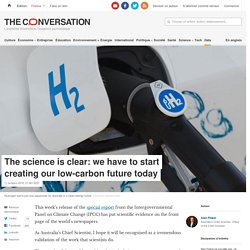
As Australia’s Chief Scientist, I hope it will be recognised as a tremendous validation of the work that scientists do. The people of the world, speaking through their governments, requested this report to quantify the impacts of warming by 1.5℃ and what steps might be taken to limit it.